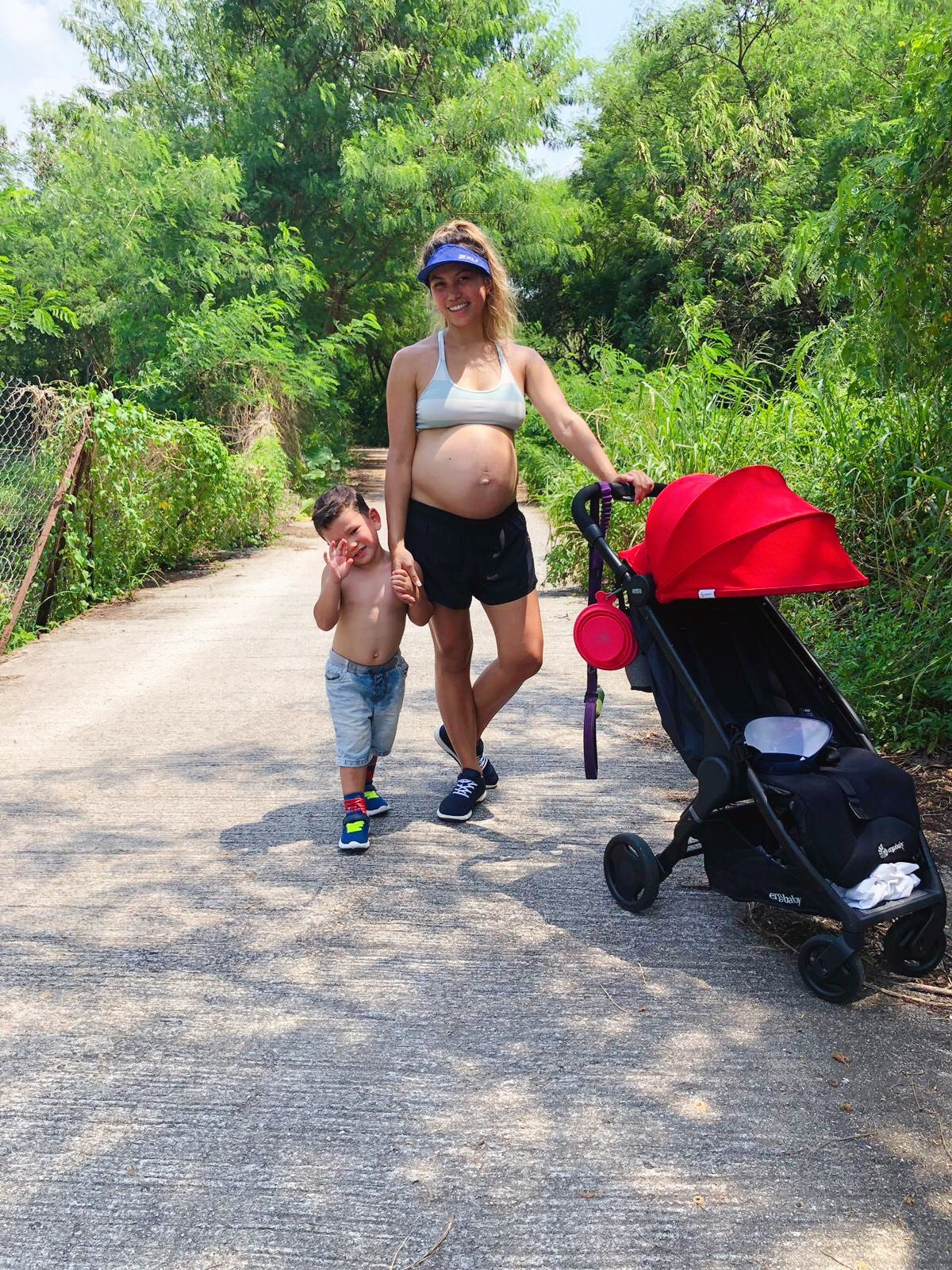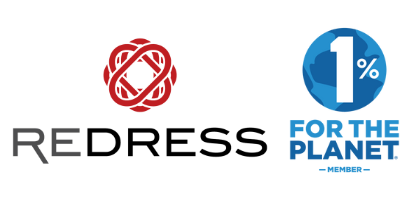We’re excited to introduce Just Peachy Ambassador, and our first expert in our Body Talk series, Ziggy Makant. A Personal Trainer, podcast host, holistic life coach, and wellness advocate, Ziggy is a busy mother of two on a mission to promote a positive postpartum body image, pre & post-natal physical and mental wellness with a healthy dose of authenticity.
Ziggy’s Instagram zig.fitmama began as a means to inform friends of her personal postpartum journey, which quickly grew into a community of like-minded mothers who not only resonated with her story but also benefited from her health, wellness, and fitness expertise. Two years after the birth of her first son, Ziggy became a certified Pre & Post-Natal Coach driven by her passion to help women feel physically and mentally prepared for pregnancy, labour & delivery, and to recover both emotionally and physically in postpartum.
We chat with Ziggy on body image, how women should prepare their bodies for pregnancy & birth, why a holistic wellness approach is important and how her experiences have impacted her parenting style and everyday choices.
As a Personal Trainer, you’ve built an online community on zig.fitmama sharing your own relatable personal stories on body image and motherhood. What inspired you to be so vulnerable and why is it important to you to share?
I’m naturally an oversharer. Initially, I shared my postpartum journey just with my friends. I only had about 1000 followers, all of whom I knew, when I began posting my true postpartum journey - stretch marks, breastfeeding struggles, a postnatal mood and anxiety disorder, and trying to be my best as a stay at home mum in Hong Kong. My platform grew as I started sharing my expert knowledge with my own personal journey. I had pelvic floor issues in the form of stress urinary incontinence, and abdominal separation, but still wanted to feel strong and confident in my skills and body again. My audience and client base were mainly mums who wanted to work out with their little ones or have a friendly space to bring their kids to work out in!
By the time I had my second child and the world was plunged into a pandemic, a lot of my journey became less about fitness and more about my parenting journey, and my journey through womanhood - fitness and wellness still being a major part of my mental and physical health.
It’s important for me to share because representation matters. Our experience as mothers is universal. We’re not strange or weird. Someone might look put together on the outside but when we see them going through the same struggles with their post-partum bodies and navigating motherhood - it normalizes everything and it’s less shameful. As a personal trainer, in clothes, I look fit, confident and strong, but I’m sharing how I feel about my body and changes postpartum to normalize all the feelings associated with getting comfortable in your skin again.
Why should women prepare their bodies for birth with prenatal fitness? How can they support their bodies through movement?
Birth is a physical, spiritual and emotional event. Most people prepare by going to breathing classes, reading birth stories, visiting midwives and doctors. But – whether you’re having a vaginal delivery, labour or surgery, your uterus and pelvic floor are still muscles - they contract and relax, so it’s important to physically and mentally prepare for birth.
In a standard pregnancy (ie. non-high-risk), prenatal interval training will get your heart rate up, your body can go through the feeling of tiredness and you can learn to control your breathing and mentality, with periods of rest. This can be compared to the physical process of active labour whereby you’ll have uterine surges for a few minutes, they will subside, and you get a short rest before the next surge arises.
With medicated labour, you don’t feel the same sensations, but it’s important to be physically strong – to prepare your pelvic floor to be able to relax, and your legs to be strong enough to hold a squat position.
In a standard pregnancy, insulin resistance develops and assists in storing fat as a protective mechanism for your baby, so it’s not uncommon to gain weight in addition to that of just your baby, placenta and amniotic fluid. So, exercising to help maintain a healthy weight gain during your pregnancy is important. In addition to this, exercising during pregnancy is proven to produce better mental health outcomes; it makes you feel better. Moving your body makes you feel good.
The goal for exercising in pregnancy is always to have a comfortable pregnancy, help you achieve your ideal birth (within the scope of physical preparedness), and have a better postnatal recovery. Whether you’re a CrossFit athlete, or you have never exercised in your life, the right prenatal training can give you the tools to move functionally, for example, how to get out of bed safely without exasperating your pelvic floor issues, feeling confident moving around after a C section, or having the correct breathing and bracing strategies, and movement patterns to lift your baby confidently repeatedly throughout the day and night.
After training with my first baby, I upskilled myself and became educated around issues surrounding pelvic floor, abdominal separation, and informed birth. My goal is always to prepare my prenatal clients for a better birth and happier postpartum.

We are all aware that giving birth and raising a newborn is a physically exhausting process (albeit rewarding, of course!). At what point should a Mom begin her postnatal fitness routine, and what does that look like?
Ideally, we would like doctor's clearance to exercise at 6 weeks, and then I like mothers to go see a pelvic health (women's health) physiotherapist for a more in depth assessment of their abdominal wall, scar tissue massage (if any needed), pelvic floor strength testing (whether internal or external ultrasound assessment).
We know that prior to 6 weeks, mum is going to be sitting in and out of bed, picking up and carrying the baby (2-5kg weight). Getting up and off the floor or sofa. Carrying car seats (10kg) and pushing strollers with baby and bags in them. So when we think of those early weeks, we still need some body awareness, movement strategies and breathing (whilst lifting) strategies to support mum. Postural changes happen almost instantly from pregnancy to postpartum, so if I can get mum in during her pregnancy and give her some tools for those early weeks, then she can feel more confident and empowered that she isn’t doing herself more harm than good.
The latest research recommends avoiding impact (running, jumping, skipping) before 12 weeks postpartum to allow the tissue and fascia within the pelvis to heal and recover. If you notice a heaviness, bulging, sense of urgency or involuntary leaking of urine, seek help from a pelvic health physio as soon as possible.
You’re not only a Pre & Post Natal Trainer at Joint Dynamics Evolve, Mother of two and Holistic Health Coach, but you’re also the co-founder of the MomBodySoul podcast where you dive into a variety of topics including parenting, relationships, mindfulness and eco-conscious living. What inspired you to create the podcast?
The MomBodySoul Podcast was born out of the pandemic. Lindsay, my co-host, and I trained each other in our respective disciplines and would share stories from conception, pregnancy, postpartum, motherhood, parenting, relationships, and we wondered why no one was having these conversations. In particular, topics specific to hong kong like (shorter) maternity leave, birthing at a later age, a later fertility journey.
We host a range of different professionals to share insights and interesting stories. People need to hear these stories so people don’t feel alone on their journey. There are resources for like-minded individuals. Our most popular episodes include birth during COVID, solo parenting, sex after kids.
MomBodySoul was created to give hope. Lindsay and I are a bit “woo woo” but we’re also practical. We strike a balance of the two talking about motherhood, bodies and inner work (soul work).

Why is holistic wellness and mindfulness important? How does that contribute to your parenting style?
People aren’t just one thing, we are multi-faceted. I like to think that I blend science and spirituality into all aspects of my life. Similar to birth, it’s not just a physical and emotional event, it’s also a spiritual event.
It’s the same with training and coaching. I listen and talk to people during training. It’s not just physical training. My clients need to work out emotional stuff too. As a trainer, I focus on exercise, nutrition and mental health.
Kids are so multi-faceted. Becoming a parent taught, and continues to teach me about my own mindset emotions. I re-parent myself by helping to raise my children. I try to be a well rounded-parent and role model; modelling that you should look after your health, have alone time and eat well with no food pressure, and use your physical body to enjoy exercise; exercise is not a punishment. Holistic wellness and mindfulness enables me to become a better parent, a better coach, friend and a better person.
What inspires you to make eco-conscious choices?
I was inspired by moms in my circle. I’ve had great influences like Vicki from Petit Tippi and the moms I trained post-partum who wrote for Green Queen. They educated me on how easy and inexpensive it is to make eco switches.
When I had my first child, I noticed how much waste we produced, from single-use wet wipes to short-lived clothes he quickly outgrew. Then when I had my second child, I committed to trying cloth diapering. With my then 3-year-old, he was still in disposable nappies – it’s costly long term and a waste of resources! Diapers take 500 years to degrade, I felt terrible that our children have to inherit this Earth. We know better (unlike our parents), so we can make simple choices to do better. It doesn’t mean living entirely zero waste.
I’ve worked with so many women who have had hormonal issues. Their endocrine systems are negatively affected by products used on the skin, processed foods they eat, plastics leaching into foods. Plastic is an endocrine disruptor that stops everything from working cohesively together inside the body. I have just seen and experienced enough to want to make a difference in any manageable way that I can!
It’s been a slow education with gradual change over the course of a few years. We recycle every weekend at the recycling centre and use reusables wherever possible. We hand down, donate or resell clothes on Retykle. We’re transitioning from single-use, always trying to make better choices around reusables.

Why did you choose cloth diapering for your family and what impact has it made on your lives?
I did a Cloth Diapering workshop with Vicki at Petit Tippi. She made cloth diapering seem easy and manageable with no pressure. If you only cloth diaper 10 times, you’re still reducing diapers that go into landfills. You’re still reusing in some way.
We fully cloth diapered at the start of the pandemic. Now my youngest is a little older, we use disposables when we’re out of the house and we cloth diaper at home for convenience for the family.
With cloth diapering, you don’t have to purchase everything new. It’s a circular movement - you can purchase cloth diapers secondhand and they work great! You may need to make small repairs but it’s not expensive and daunting. Once you get into the laundry flow and diapers can dry quickly on a sunny balcony. It’s a simple solution!
Finally, if you could turn back time and talk to your pre-Mom self, what would you tell her?
Save more money before you have kids! But also, don’t be scared to spend money on better quality choices for the kids. In the past, I made purchases that were the cheapest but maybe not the best quality. Choose quality over cost.
Ask for help when you need it. Have a support system in place and have a tribe ready. I wasn’t open to listening to other people’s advice during my first pregnancy. The advice I was receiving was fear-mongering rather than support. Surround yourself with the right supportive people. During early motherhood, the right supportive people will fill your fridge, sit with you when breastfeeding and won’t expect you to host them!
Ziggy is a Just Peachy Ambassador and credits our founder, Victoria, for teaching her everything she knows about cloth diapering.
Follow Ziggy:
Instagram @zig.fitmama


